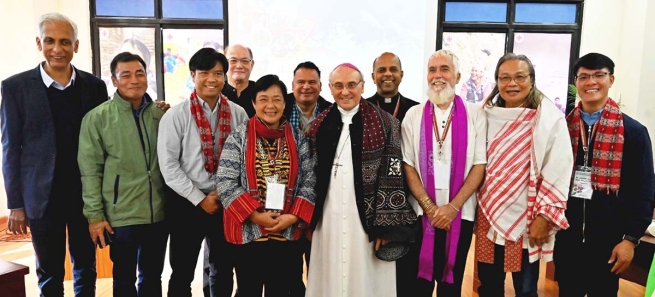It is estimated that 40% of the world’s Catholic faithful belong to Indigenous Peoples. In Asia, this percentage is even higher, with 70% of Asian Catholics considered Indigenous or Tribal. Therefore, Pope Francis’s call to listen to Indigenous Peoples in the Synodal Church is of great importance to the Asian hierarchy.
Salesian Bishop George Palliparambil, the Bishop of Miao, India, was one of the lecturers at the forum, presenting on the topic “Tribal Genius: Superficially Seen but Still Unknown.” The missionary prelate, who has served as the chairman of the Indian North-East Regional Commission for Evangelization, posed thought-provoking questions: “How can the Church be truly indigenous? How can we reconcile this and think together about it?” He suggested that one idea was to ensure that all people feel the same, so no one feels different from others. However, he acknowledged the challenges of this approach, especially considering the current living conditions of Indigenous Peoples around the world.
“One of the temptations of modern societies is to dismantle traditional structures without understanding their deep meanings. For example, some societies are matrilineal and are among the most efficient. In these societies, the female head of the household is fully appreciated and loved, ensuring stability and a profound connection to nature. Their ways are always tied to ancestral traditions and the environment,” said Mgr. Palliparambil.
The Forum that was celebrated between 10 and 16 November in Katmandu, and it was inaugurated by the message of Cardinal Michael F. Czerny, SJ, Prefect of the Dicastery for Promoting Integral Human Development, who reminded that Pope Francis encourages the recognition and respect for Indigenous identities, traditions and spirituality and the dialogue as important instruments in the Synodal Church. Bishop Gerald John Mathias of Lucknow, India, has called upon the Catholic Church in Asia to intensify its commitment to Indigenous Peoples, highlighting a history of neglect and the need for direct action:
“Despite this slight, indirect reference,” Bishop Mathias said, referencing the Federation of Asian Bishops’ Conference’s (FABC) first Assembly in 1974, “for 25 years, Indigenous People went largely unnoticed by Asia’s bishops—although the largest single minority of Asia’s Christians is Indigenous!”
Bishop Paul Simick of Nepal urged Church leaders to embrace synodality as a pathway toward integrating Indigenous wisdom into the life of the Church. In his opening remarks, Bishop Simick welcomed delegates to Nepal’s mountainous landscape, emphasizing the significance of Dhulikhel, a traditional Newari town, as the ideal setting to explore Indigenous culture and spirituality.
The Apostolic Nuncio to India and Nepal, Archbishop Leopoldo Girelli, highlighted the inherent values of tribal societies as models for modern communities, particularly in fostering solidarity, ecological stewardship, and spiritual enrichment. He noted that “dialogue with primal cultures will prove educative to every society that has long lost touch with its tribal roots.” Highlighting the affinity between tribal values and Gospel teachings, he stressed the importance of preserving their traditions.
“If the preservation of songs, stories, dances, and festivities is important, the survival of genuine tribal values is even more important, as they express their deep tribal spirit,” he said.
The Forum was attended by other bishops like Mgr. Hyginus Kim Hee-Joong, Archbishop Emeritus of Gwangju, South Korea and Member of Dicasterium pro Dialogo inter religiones; Mgr. Simon Poh, Archbishop of Kuching, Malaysia; Mgr. Sebastian Tudu, Bishop of Dinajpur, Bangladesh and Mgr. Gerard John Mathias, Bishop of Lucknow, India. There were also diocesan, Jesuit and Redentorist priests, professors, religious men and women, young people and Dr. Yangkahao Vashun, Professor of Systematic Theology and Tribal Theology, representing the Baptist church in Northeast India.
Some members of the Salesian Family of Asia, along with Mgr. George Palliparambil, included Mother Christine Mynsong, Superior General of the Missionary Sisters of Mary Help of Christians in Guwahati, India; three Salesian priests: Fr Stephan Biswakarma, Director of the Nepal Don Bosco Society; Fr George Plathottam, Consultor to the Dicastery for Communications and director of the Forum; Fr Jolino Vieira, social communication delegate for Timor-Leste; and Fr Albeiro Rodas, social communication delegate for Cambodia. All of them are involved in apostolates for Indigenous Peoples in their respective countries. Additionally, some teachers and young people associated with the Salesian Family in Nepal were also present.


